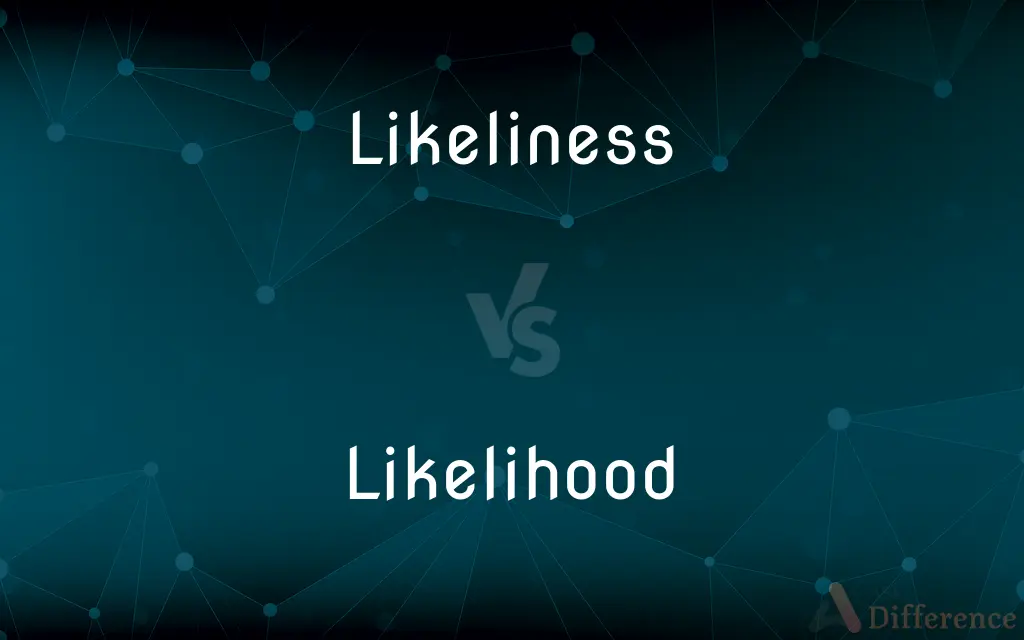Likeliness vs. Likelihood — What's the Difference?
Edited by Tayyaba Rehman — By Fiza Rafique — Updated on September 30, 2023
Likeliness and Likelihood both refer to the probability of something occurring. While both are often used interchangeably, "Likelihood" is more common in formal contexts.

Difference Between Likeliness and Likelihood
Table of Contents
ADVERTISEMENT
Key Differences
Likeliness and Likelihood are two terms that address the probability or chance of something happening. While they essentially convey the same concept, there are nuances in their usage and preference. Likeliness, for instance, is derived from the word "likely," which is an adjective that describes the quality of being probable. On the other hand, Likelihood, while also conveying a sense of probability, tends to be the preferred term in statistical or more formal contexts.
If you dive into the construction of both words, Likeliness employs the suffix "-ness," which is commonly used to turn adjectives into nouns, indicating a state or quality. This means Likeliness is essentially referring to the state of being likely. Likelihood, in contrast, uses the suffix "-hood," which often implies a state, condition, or quality, making its meaning very similar to Likeliness but with a slightly different linguistic root.
In practical usage, if someone is discussing everyday events or scenarios, they might use either term based on personal preference. However, when delving into subjects that require precision, such as mathematics, statistics, or science, Likelihood is the term more often chosen. This is not because one is more accurate than the other, but because Likelihood has traditionally been the term associated with these fields.
Comparison Chart
Definition
State of being probable.
Probability or chance of something happening.
Suffix
Uses "-ness" to indicate state or quality.
Uses "-hood" to imply a state or condition.
ADVERTISEMENT
Common Usage
Both everyday and formal contexts.
Primarily formal contexts, especially statistics.
Origin
Derived from "likely."
Has its own standing in the language.
Interchangeability
Often used interchangeably with Likelihood.
More frequently used than Likeliness.
Compare with Definitions
Likeliness
A measure of expectation or anticipation.
Given his expertise, the Likeliness of his success is significant.
Likelihood
The probability of a particular outcome.
The Likelihood of snow tomorrow is 80%.
Likeliness
A gauge of potential based on current factors.
The team's performance suggests a high Likeliness of winning the championship.
Likelihood
A measure of the certainty or uncertainty of an event.
Despite the challenges, there's a good Likelihood they will succeed.
Likeliness
An estimation of occurrence based on evidence.
The symptoms showed the Likeliness of a common cold.
Likelihood
A statistical measure of expected occurrence.
Based on the data, the Likelihood of this event repeating is low.
Likeliness
The quality of being probable or likely.
The Likeliness of rain today is high based on the forecast.
Likelihood
The state or fact of something's being likely; probability
Situations where there is a likelihood of violence
Young people who can see no likelihood of finding employment
Likeliness
The state or condition of being foreseeable.
The clouds indicate the Likeliness of a storm.
Likelihood
The state of being probable; probability.
Likeliness
The condition or quality of being probable or likely to occur.
Likelihood
Something probable.
Likeliness
Likelihood, probability or chance of occurrence; plausibility or believability.
Likelihood
The probability of a specified outcome; the chance of something happening; probability; the state or degree of being probable.
In all likelihood the meeting will be cancelled.
The likelihood is that the inflation rate will continue to rise.
Likeliness
Suitability; agreeableness.
Likelihood
The probability that some fixed outcome was generated by a random distribution with a specific parameter.
Likeliness
Likeness; similarity.
Likelihood
Likeness, resemblance.
Likeliness
Likelihood; probability.
Likelihood
(archaic) Appearance, show, sign, expression.
Likeliness
Suitableness; agreeableness.
Likelihood
Appearance; show; sign; expression.
What of his heart perceive you in his faceBy any likelihood he showed to-day ?
Likeliness
The probability of a specified outcome
Likelihood
Likeness; resemblance.
There is no likelihood between pure light and black darkness, or between righteousness and reprobation.
Likelihood
Appearance of truth or reality; probability; verisimilitude.
Likelihood
Statistical probability; probability of being true or of occurring in the future; as, the likelihood of being abducted by aliens is close to zero..
Likelihood
The probability of a specified outcome
Likelihood
The chance or odds related to a specific event.
Given the circumstances, there's a high Likelihood we'll need to reschedule.
Likelihood
An anticipated outcome based on current indicators.
With those storm clouds, there's a strong Likelihood of rain.
Common Curiosities
Can I use Likeliness in a scientific paper?
While you can, Likelihood is often the preferred term in scientific literature.
Which term is more common in statistical contexts?
Likelihood is more commonly used in statistical or formal contexts.
Does Likeliness have a different meaning than Likelihood?
Their meanings overlap, but their usage can vary based on context and preference.
Can Likeliness and Likelihood be used interchangeably in everyday conversation?
Yes, in most everyday contexts, they can be used interchangeably without causing confusion.
Is there a significant difference in the definitions of Likeliness and Likelihood?
Not in essence. Both refer to the probability or chance of an event happening.
Are there contexts where only one of the terms should be used?
In statistical or very formal contexts, Likelihood is often the preferred term.
Why might someone choose Likeliness over Likelihood?
It could be a matter of personal preference or the specific context of the conversation.
Are Likeliness and Likelihood synonyms?
Essentially, yes. They both refer to the probability of something happening.
Which term is older?
Both terms have been in use for centuries, but Likelihood is more rooted in historical English.
Which term is more commonly found in literature?
Both can be found, but Likelihood might be slightly more prevalent due to its broader application.
Share Your Discovery

Previous Comparison
Introduction vs. Definition
Next Comparison
Doable vs. FeasibleAuthor Spotlight
Written by
Fiza RafiqueFiza Rafique is a skilled content writer at AskDifference.com, where she meticulously refines and enhances written pieces. Drawing from her vast editorial expertise, Fiza ensures clarity, accuracy, and precision in every article. Passionate about language, she continually seeks to elevate the quality of content for readers worldwide.
Edited by
Tayyaba RehmanTayyaba Rehman is a distinguished writer, currently serving as a primary contributor to askdifference.com. As a researcher in semantics and etymology, Tayyaba's passion for the complexity of languages and their distinctions has found a perfect home on the platform. Tayyaba delves into the intricacies of language, distinguishing between commonly confused words and phrases, thereby providing clarity for readers worldwide.













































